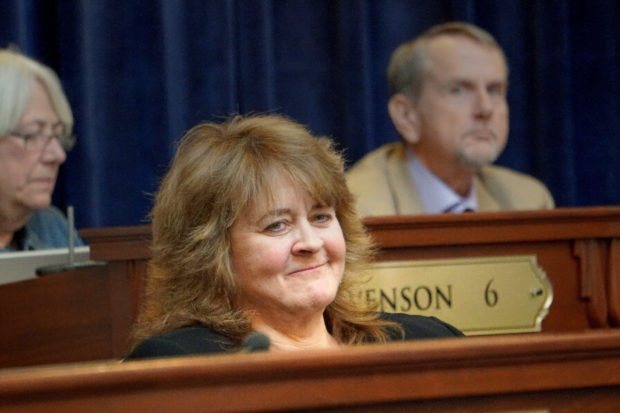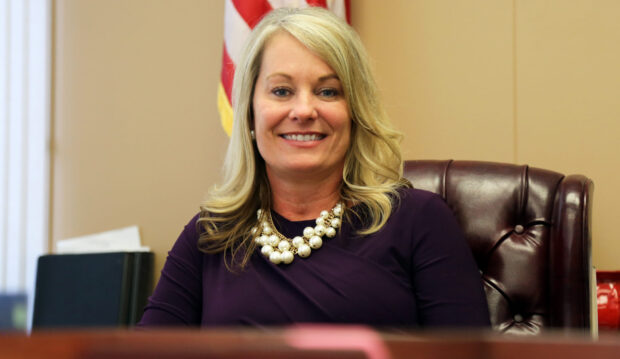Several House Education Committee Republicans displayed open hostility Tuesday over a recommendation to train teachers and help support students’ social-emotional well-being.

Superintendent of Public Instruction Sherri Ybarra and her staff were on hand to present an overview of her $1 million social-emotional budget recommendation, which was based on a recommendation issued last fall by Gov. Brad Little’s “Our Kids, Idaho’s Future” task force.
Ybarra and her staff presented the recommendation alone; Little, State Board of Education President Debbie Critchfield and task force co-chairman Bill Gilbert did not attend the meeting.
On paper, Tuesday’s meeting seemed routine.
The task force — stacked with educators, business leaders and policymakers — backed the social-emotional learning recommendation Ybarra’s budget proposes.
Little supports the social-emotional recommendation.
Teacher of the Year Stacie Lawler has made mental wellness and suicide prevention her signature cause. Lawler earned a standing ovation last month from the same House Education Committee after sharing a personal story about her own children’s struggles.
Ybarra also backs social-emotional learning training and resources. Ybarra said professional educators have practically begged for additional support — since Idaho’s suicide rate ranks about fifth in the nation and the new Youth Risk Behavior Survey shows that 23 percent of students have seriously considered suicide in the last year, the highest level in a decade.
Ybarra and Little have both requested $1 million (out of a $2 billion proposed education budget) to help with training and resources. The money would go to training for teachers to help them identify at-risk students, intervene in a crisis and help address risky youth behaviors while creating a healthy classroom environment.
Everything seemed routine and straightforward, but Tuesday’s meeting proved to be anything but.

“Let me start by saying I do not share your enthusiasm (for the social-emotional learning proposal),” Rep. Barbara Ehardt, R-Idaho Falls, told an Ybarra staffer. “What kind of disruptive behavior are we talking about?”
“We’re talking about more time spent, um, in an area with kids and teachers that really is a role that should be dealt with in the home,” Ehardt said. “It seems like everything is flipping.”
Rep. Tony Wisniewski, R-Post Falls, asked legislators to engage in a thought experiment, which he promised would take only 10 seconds.
Go back a generation or more, Wisniewski said, back to when legislators were in school.
For many, it was the 1960s, he said, when things were different.
There was respect then, he said.
Parents, Wisniewski said, would “take us behind the woodshed, if necessary.”
He then compared the social-emotional recommendation to the dystopian 1932 Aldous Huxley novel “Brave New World.”
“It’s scary to me, and I’m not scared of a lot of things,” Wisniewski said. “Whatever happened to character development?”
At one point, Chairman Lance Clow, R-Twin Falls, attempted to jump in and get the meeting back on course.
“The situation is we have teachers who have to face this and they have to deal with it,” Clow said. “Once it’s already in your classroom, they have very few tools.”
By that point, the floodgates were open and the questions and pushback continued for another 45 minutes.
Rep. Dorothy Moon, R-Stanley, said Idaho has already invested in school counselors and said numerous programs are already in place to address suicide prevention. She suggested that Idaho needs to have “some accountability” for those existing programs.
One by one, three committee Republicans gathered their things and left the meeting out a back door while the presentation continued.
First, by 10:19 a.m., Rep. Judy Boyle, R-Midvale, left.
Then Rep. Gayann DeMordaunt, R-Eagle, walked out.
Finally, Moon got up and left moments after asking SDE officials a series of questions.
None of them explained their departure or returned to the meeting, which adjourned at 10:45 a.m.
Later that afternoon, Boyle said she stepped out to talk in the hallways with Speaker of the House Scott Bedke, R-Oakley, about a bill and a couple of other issues.
“The speaker has the tightest schedule of all of us, so when we have a question for him, he catches us in a spare minute here or there,” Boyle wrote in an e-mail. “When he is available, we always respond.”
Late Tuesday afternoon, DeMordaunt said she left the meeting early to speak with a group of 100 students from her legislative district. Several of those students from Eagle High School had attended the early portion of Tuesday’s committee meeting, but most left before the discussion of social-emotional learning. DeMordaunt sent Clow a note shortly before leaving the meeting explaining she was going to speak with students.
The Republican pushback evoked a strong rebuke from Rep. Steve Berch, D-Boise.
After listening for several minutes, Berch said Idaho students are dying by suicide far too often, while other students struggle with drug use or come from broken homes. Social media and peer pressure, Berch said, inflame the whole situation.
“I’m not interested in building a bridge to a mythical version of the 1950s where every parent is Ward and June Cleaver,” Berch said.

The meeting adjourned without any official action.
Afterwards, Ybarra had strong words during an interview with Idaho Education News, saying some legislators turned the debate into “a political football.”
“I just don’t know how you can say no to that,” Ybarra said. “I just don’t know how you can consciously, in good faith represent the people of Idaho and say, ‘Tired of being asked for money for programs.’”
“We have mental health issues in the state of Idaho that need to be addressed,” Ybarra continued. “Period. End of discussion. Parents and teachers are asking for support.”
House Education’s turbulent hearing came a day before the Legislature’s education committee chairs will appear before the Joint Finance-Appropriations Committee to discuss budget priorities.
Senate Education Committee chairman Dean Mortimer asked his committee members to write out their budget priorities during Tuesday afternoon’s meeting. Mortimer, R-Idaho Falls, would not show Idaho Education News the handwritten notes — drafted by elected senators during an open committee session.
Idaho Education News received the notes Wednesday, through a public records request. Four of the nine committee members listed social-emotional training among their top three K-12 spending priorities.
Idaho Education News reporter Kevin Richert contributed to this report.
